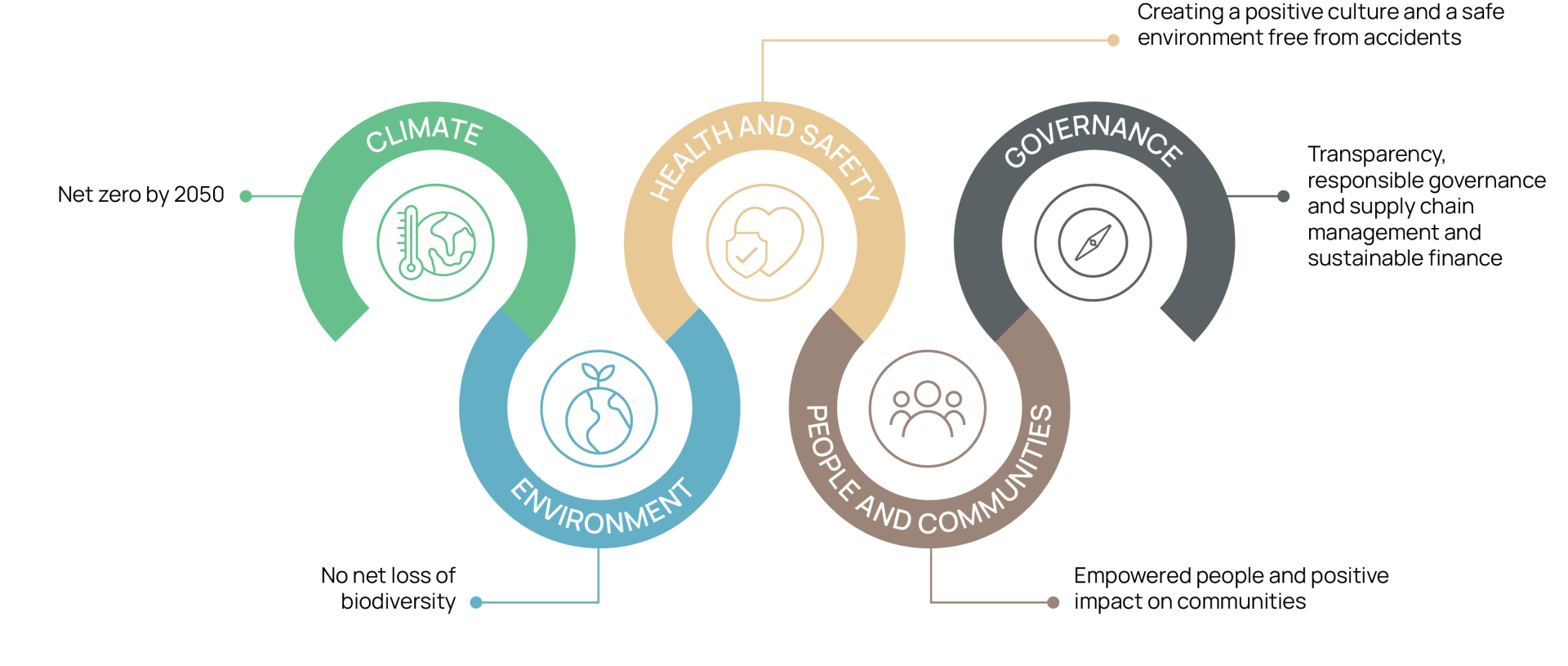Amber Grid's renewed strategy, together with EPSO-G Group companies, clarifies the Group's shared mission to accelerate energy independence and increase system reliability, as well as its vision to enable green transformation while safeguarding energy and national security interests. A range of strategic tools will be utilised to achieve these goals, including financing, innovation and digitalisation, partnerships, asset development and management, as well as improvements in supply chains and procurement.
Amber Grid aims to contribute directly to the Sustainable Development Goals. The Company focuses on ensuring access to clean and modern energy, taking action to combat climate change, developing resilient infrastructure and promoting innovation, ensuring safe working conditions, employee well-being and developing a sustainable supply chain. Green energy is at the heart of the Company's strategy and strategic plan.Sustainability is an integral part of the Company's activities, and its key objectives are integrated into the EPSO-G group's long-term corporate strategy, which was updated in 2024.
Information on Amber Grid's Strategy 2035 can be found in the Amber Grid Management Report 2024, section. A more detailed presentation can also be found here: Strategy 2035.
The Company's key environmental, social and governance objectives:


We contribute to each of the United Nations’ sustainable development goals through:
No net loss of biodiversity.
The Company has integrated sustainability principles into its business processes, and the management of sustainability domains by competency covers all levels.
The Company’s Board is responsible for setting, reviewing the long-term strategic sustainability objectives and monitoring indicators. The Board also approves policies on the environment, equal opportunities, health and safety of employees, anti-corruption, remuneration, performance evaluation and development. Within its remit, the Board also approves the Company’s annual objectives, which include sustainability-related objectives.
EPSO-G Sustainability Development Manager is responsible for monitoring and coordinating the achievement of sustainability objectives. Meanwhile, within the Company, the relevant environmental, social and governance objectives are delegated to the Company’s different functional units (e.g. environmental, occupational safety, human resources, risk and compliance management, etc.) according to their competences. The Company has delegated a separate person responsible for ensuring equal opportunities within the Company.
The Company aims to integrate sustainability principles into all its activities and processes.
The Company aims to transform the energy sector by striking a sustainable balance between environmental, social and economic objectives.
Sustainability risks are treated as an integral part of the Company’s day-to-day operations and are integrated into the risk management process. The Company assess all the risks against the criteria set for the sustainability risks. Risks that meet these criteria are assigned to the relevant sustainability risk type.
Disclosures on compliance with the EU Taxonomy Regulation that relate to Amber Grid's taxonomic economic activities are provided in the consolidated annual report of EPSO-G.
The sustainability-related policies are publicly available. Details on the policies are available:
In October 2024, Amber Grid handed over to public institution Memorabilis 9 vehicles previously used in Amber Grid activities. The total residual value of vehicles is EUR 1948.88. The purpose of using the support is to help rebuild Ukrainian energy facilities damaged by the war. Also in 2024 Amber Grid has allocated 75,000 euros for long-term incentive scholarships for advanced and motivated first- and second-year engineering students of VILNIUS TECH and Panevėžys College. The scholarship awarded to students will amount to 300 euros per month.
In 2022, we updated our Equal Opportunities Policy, which defines forms of discrimination, harassment, sexual harassment and violence, how to identify them, prevention measures, reporting and handling procedures, protection measures for whistleblowers and victims, and the forms of assistance provided to them. The Company does not tolerate discrimination, promotes a work environment that reflects the diversity of society, and implements the principles of respect for diversity in its activities. The benefits of employee diversity for teams and the organisation as a whole are also important to the company. The Company regularly collects and publishes data on the diversity of its workforce, including gender, age, education and occupation. In 2022, we carried out an Equal Opportunities Survey (an assessment tool based on employee and employer surveys/questionnaires). Based on the data collected, the Office of the Equal Opportunities Ombudsman (OEO) gives the workplace a score out of ten and provides a detailed report and recommendations on how to ensure equal opportunities in the workplace). The company's Equal Opportunities ruler is set at 8.5 points.
Monitoring, recording and communicating changes in important indicators is a crucial part of our company’s sustainability activities. We are transparent and provide detailed information, so every consumer and investor have public access to a comprehensive report on our activities and plans.
Preparation of reports is guided by international requirements: the principles of the UN-initiated Global Compact and the recommendations of the Global Reporting Initiative. This helps to measure performance against relevant economic, environmental, staff, human rights, market, and public relations indicators.
Sustainability reports of Amber Grid: